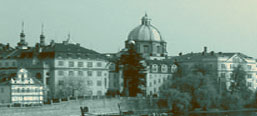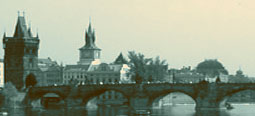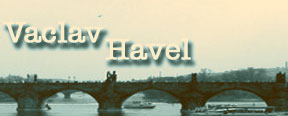The
Revolutionary
By 1957, Vaclav Havel, then 21, had fulfilled his military
service in the Czechoslovakian Army. From 1955, throughout
the repressive communist reign, as citizen, author and
playwright, he constantly protested against the Regime,
targeting its agenda of normalization (which sought to
undo all previous reforms), via innumerable letters, articles
and plays. Some bold, some deceptively subtle or suggestive,
every one of his works, in some way, sought fairness and
basic human rights in Czechoslovakia, as well as the world
in general. These, on many occasions, however, were banned
explicitly by said government, and as a result, he himself
was locked up for the expression of such pro-humanitarian
and pro-democratic sentiments.
In
the 1970's and 80's, for his outspoken self-expression
against the government he was arrested time and again.
In 1975, in an open letter to President Gustav Husak,
he attempted to bring to light the social ills plaguing
the country, for which he was arrested. In January of
1977, he helped produce, and sign, along with prominent
figures such as Jiri Hajek and Kan Potocka, in addition
to over a thousand common Czechoslovakian citizens, the
anonymously authored document, Charter
77, which specifically named him as one of its spokespersons.
On account of this, he was sent to prison yet again for
months, then put under house arrest until 1979. In April
of that year, he was sentenced to 4 and a half years of
hard labor, and five additional years in prison, after
co-founding the Committee for
the Defense of the Unjustly Persecuted (VONS) in direct
retaliation against the unjust discrimination, and harsh
persecution of Charter 77
signers by the government. By 1989, Havel was a leader
in the Civic Forum, a coalition
of communist opposition groups. After getting out of jail
after a nine month prison sentence in November of 1989,
he delivered a speech from the balcony of the Melantrich
publishing house in Vaclavsje Square in Prague, rallying
over half a million people to continue demonstrations
against the oppressive government.
Soon
after, the movements of the Civic
Forum (CF), and Slovak group PAV (Public Against Violence)
gained momentum, culminating in the bloodless Velvet Revolution,
which resulted in the ousting of the Communist Regime
by the end of 1989. A newly drawn up constitution by December
heralded the establishment of the Czech and Slovak Federal
Republics. The elections at around the same time proclaimed
the beginning of a free new era of order under the nonpartisan
presidency of writer and humanist Vaclav Havel.





